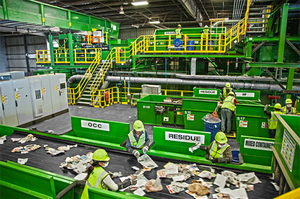NWRA noted its particular concern with the categories of “Plastic waste from living sources” and “Unsorted waste paper.”
The National Waste & Recycling Association (NWRA) has presented comments to the World Trade Organization (WTO) in response to China’s July 18 filing, signaling its intent to forbid 24 kinds of solid wastes by the end of 2017.
In its statement, the NWRA wrote, “This ban will significantly impact the recycling industry in the United States as well as on the Chinese manufacturing that relies on these recycled materials. We respectfully request that the Chinese government reconsider this ban. Further, we support high quality standards for recyclable materials and support policies to achieve them. Ultimately, we believe that by using high quality standards, China ensures that its manufacturing sector has the raw materials needed to continue to produce goods while ensuring that the recycling industry remains viable into the future.”
NWRA noted its particular concern with the categories of “Plastic waste from living sources” and “Unsorted waste paper.”
In its comments, the NWRA noted, “These materials represent the residential and commercial recycling sector which our members support. A significant amount of these materials are exported, mainly to China. In 2016, approximately 41 percent of paper recovered in the North America was exported, with about a quarter of recyclable paper collected in the United States exported to Chinese mills. Similarly, over 20 percent of post-consumer bottles and 33 percent of non-bottle rigid plastics from the U.S. were exported in 2015.”
Among other comments:
Uncertainty regarding the ban
With only a two day comment period and very limited information and background provided, we have numerous questions that remain unanswered. For instance, we remain unclear as to the exact materials that the ban covers. What is meant by “plastic waste from living sources” and “unsorted waste paper”? Does the former refer to what we would call “post-consumer” recyclables that are generated by the final users of a product? Does the latter term literally mean bales of paper that have not been sorted into a specific grade? If so, does this indicate an intent to ban all imports of sorted mixed paper?
Support for high quality materials
NWRA understands that end markets expect to buy bales of recyclable materials that meet their specifications in regard to “contaminants” and “prohibitives.” We work hard to meet end markets’ expectations that they are buying high quality materials for reuse. Our member companies processing facilities aim to completely eliminate all materials that do not meet those specifications. To further achieve this goal, we support the adoption of standards for recyclable materials and enforcement of those standards by the Chinese government as part of its efforts to ensure that bales of recyclables meet proper specifications. In particular, we support the use of existing, internationally recognized specifications already in use that include garbage as a contaminant.
Recycling benefits
Recycling benefits the environment in a number of ways. By providing raw materials as industrial feedstock, use of virgin raw materials is avoided along with the attendant environmental ramifications of exploiting and extracting those materials. In addition, recycling reduces greenhouse gas emissions. According to the U.S. EPA, the greenhouse gas benefits from recycling paper/paperboard and plastics alone netted 141.6 MMTCO2E reductions in emissions in 2014.
Problems resulting from this ban
Given the amount of recyclable materials shipped to China, American domestic markets cannot absorb the materials that would be banned. In addition, municipalities across the United States would be faced with potentially dramatic changes to the value of their materials and possibly lose the ability to sell the material at all resulting in landfilling these commodities. The outfall from such actions could have a traumatic and devastating effect on the recycling industry.
Recommendations
Enforce specifications for recyclable materials – NWRA supports bans on waste materials. However, the recyclable materials exported to China identified by the ban are valuable commodities that are used in the manufacturing on new products. We recommend that China enforce specifications on quality rather than outright ban these materials.
Clarify definitions– NWRA requests that China clarify the scope of the ban so that we can understand exactly which materials are affected. Clear definitions and specifications for all materials affected are necessary to be able to disseminate information to recyclers for compliance. The lack of such definitions has led to significant confusion about what materials remain eligible for export.
Delay the implementation – Should China elect to implement the ban, we request that the timeline be adjusted to allow for the development of alternative markets and solutions. Rather than implementing the bans by the end of the year, which could have a catastrophic impact on the United States’ recycling infrastructure, we request that the ban be implemented over a period of time. We recommend that the phase-out occur over a five year period.
Conclusion
Our members will face significant challenges should these bans move forward. We request that the Chinese government reconsider and instead, enforce strict standards on high quality materials.
By issuing the comments, the NWRA joined the Institute of Scrap Recycling Industries, which has issued several responses, and the Solid Waste Association of North America (SWANA), which issued its own response last week.
About the Author(s)
You May Also Like


